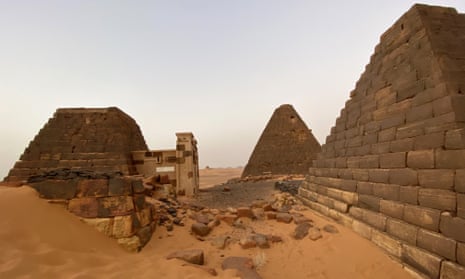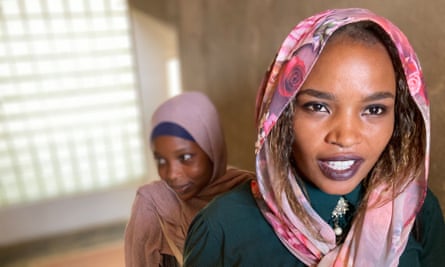Young Sudanese archaeologists dig up history as 'west knows best' era ends
On a continent that has long attracted western expeditions, a wave of young people are now exploring sites

Tue 27 Dec 2022 07.35 EST
A late morning in Khartoum. Inside a low, dusty building in the centre of the Sudanese capital, there are crates of artefacts, a 7ft replica of a 2,000-year-old stone statue of a Nubian god, and students rushing through the corridors. Outside is noisy traffic, blinding sunlight and both branches of the Nile.
Heading down one staircase are Sabrine Jamal, Nadia Musa, Athar Bela and Sabrine al-Sadiq, all studying archaeology at Khartoum University. Not one of them is older than 24 and they see themselves as pioneers, breaking new ground on a continent that has long attracted western expeditions, specialists and adventurers but whose own archaeologists have received less attention overseas.
"It is very important that Africans do African archaeology … because then we will have our own archaeological cultures. There is a lot we understand because we are from here. The idea that people from the west know best is changing," said Sadiq.
Jamal, 22, from the remote and war-torn South Kordorfan province, said stereotypes promoted by films and literature in the west were out of date. "There is an idea of what an archaeologist looks like … But they should not have a certain image or colour or features or gender," she said.

For decades, the popular image of archaeologists in Africa has been at odds with an increasingly diverse reality. Dr Ghalia Garelnabi, the acting director of Sudan's national museum, said that when she was at university 30 years ago there were only three women studying archaeology, and now there were 20.
"This is a very great change and an important one. There are more and more young women in Sudan who are interested to know about their history and they deserve to know this … Twelve years ago we had only foreign missions working here, but this is changing. Now we have many Sudanese missions digging at our sites," Garelnabi said.
Alex Vines, now director of the Africa Programme at Chatham House in London, was once an archaeologist in Zimbabwe and east Africa more than 30 years ago.
"Archaeology was dominated by western white archaeologists and has been completely transformed. It is now increasingly driven by indigenous research," he said.
Advocates of greater involvement by African archaeologists on the continent argue that this would help a discipline that has become "detached from reality".
"The cost of living, climate crisis, migration, reflecting on our identity … Archaeology can and should be speaking to all these things. We need to build something new, something that is equitable, richer and relevant," said Dr Sada Mire, a Swedish-Somali archaeologist who is currently an associate professor of heritage studies at University College London.
Mire recently helped to launch a two-year project in northern Kenya that has involved 35 people from local communities in the study of rock art. "These are people who have never thought about archaeology … They have a lot of knowledge we don't have and this just shows what people can do when they are not patronised or infantilised but just given the equipment and knowhow. It's a way of connecting two worlds," she said.
The link between imperialist exploitation of the continent and archaeological research was established as early as 1798 when Napoleon invaded Egypt accompanied by teams of French specialists set on understanding the country's past but also taking huge amounts of artefacts away.
Sudan was a British colony for nearly 60 years, and then run by a series of autocrats often beholden to external powers. Few paid much attention to archaeology. In such circumstances, western support was important in preserving what little activity continued.
Dr Eglal el-Malik, the director of the conservation department of Sudan's National Corporation of Antiquities and Museums, said she was grateful to foreign archaeologists who "never stopped coming even in our darkest times. This was a very big help for us. They truly helped Sudan in maintaining and sustaining our work, and helped build capacity for young archaeologists. We needed professionals. Now we have many."
A handful of Sudanese archaeologists have travelled recently to Europe to work on sites there, reversing a century-old flow in the other direction. "We are looking forward to the day when African archaeologists regularly travel to Europe or US to do archaeology there," Malik said.
This appeals to Sadiq, 24, who has never left Sudan. "We want to discover more and travel. I want to know more about my history but also all history. Why shouldn't we come and study your history in the west like you have done here? We could teach you something, perhaps," she said.

But the new wave of young archaeologists in Sudan and elsewhere on the continent face many obstacles. For women in particular, their choice of profession brings resistance from relatives and schools.
"For three years my family was opposed. There were all these questions: what are you doing with this qualification? Why be an archaeologist if you're a woman? How are you going to travel alone? But I was very determined," Jamal said.
Men also face prejudice and ignorance. Joshua Kumbani, 31, who has conducted groundbreaking work in southern Africa on prehistoric music-making, said he was often laughed at when he told people he was an archaeologist.
"They can't understand why I chose this profession. They think I work in the dirt with old things. Some even accuse me of being a grave digger. I have to explain this is not what archaeologists do," Kumbani said. "I think they get it from Indiana Jones and cinema. They don't have full information."
There is an acute shortage of resources. The Covid pandemic and current economic crisis has crippled governments across the continent. In Khartoum, classes are held in a 50-year-old building that gets constant power cuts in 40C-plus heat. Even in relatively wealthy countries such as South Africa, funding and facilities are often inadequate.
"The big challenge is scaling up. There is so much of Africas's heritage that has not yet been investigated and is now threatened by development and population growth," said Vines.
Malik has been at the forefront of a new push for artefacts looted during the colonial period to be returned, wherever practical, and sees the development of a cohort of young colleagues as important for Sudan. "We believe it is time that our history should be written from the point of view of the Sudanese, she said.
For Sadiq and her classmates in Khartoum, more is at stake than the task of investigation and discovery of past lives, however important that may be. A military coup last year dashed hopes of a swift transition to democracy after the fall of the veteran dictator Omar al-Bashir in 2019. Since then, more than 100 people have died in protests against the new regime, which has close relations with several repressive Gulf states and Russia.
"To be a free country, we need our own archaeologists," Sadiq said.
The year is 2033. Elon Musk is no longer one of the richest people in the world, having hemorrhaged away his fortune trying to make Twitter profitable. Which, alas, hasn't worked out too well: only 420 people are left on the platform. Everyone else was banned for not laughing at Musk's increasingly desperate jokes.
In other news, Pete Davidson is now dating Martha Stewart. An 86-year-old Donald Trump is still threatening to run for president. And British tabloids are still churning out 100 articles a day about whether Meghan Markle eating lunch is an outrageous snub to the royal family.
Obviously I have no idea what the world is going to look like in a decade. But here's one prediction I feel very confident making: without a free and fearless press the future will be bleak. Without independent journalism, democracy is doomed. Without journalists who hold power to account, the future will be entirely shaped by the whims and wants of the 1%.
A lot of the 1% are not big fans of the Guardian, by the way. Donald Trump once praised a Montana congressman who body-slammed a Guardian reporter. Musk, meanwhile, has described the Guardian, as "the most insufferable newspaper on planet Earth." I'm not sure there is any greater compliment.
I am proud to write for the Guardian. But ethics can be expensive. Not having a paywall means that the Guardian has to regularly ask our readers to chip in. If you are able, please do consider supporting us. Only with your help can we continue to get on Elon Musk's nerves.
Arwa Mahdawi
Columnist, Guardian US
-- Sent from my Linux system.

This is really impressive! thanks for share this awesome research!
ReplyDeleteI needed to see and read this post today and smile.
ReplyDelete